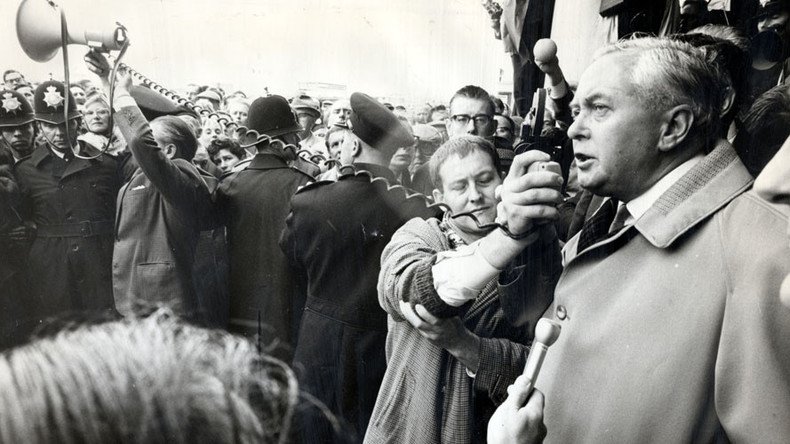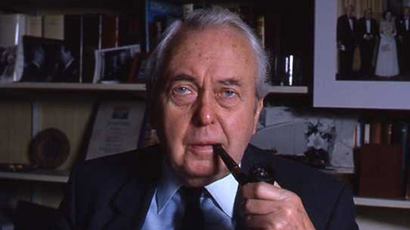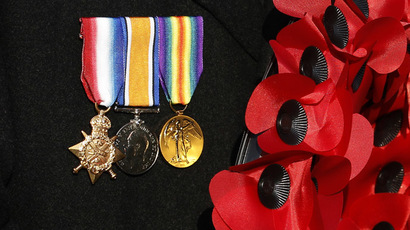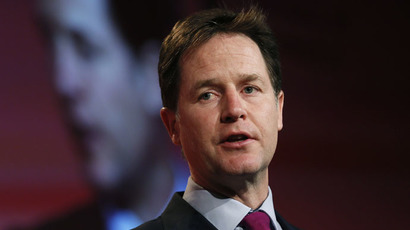Britain’s Russophobic hawks should be cast back to swinging 60s if we want new East-West détente

Fifty years ago détente was in the air as Britain, under the leadership of Harold Wilson, worked hard to bring the USA and the Soviet Union closer together and sign a ground-breaking treaty on the exploration and use of outer space for the good of humanity.
The question is: can we learn from the events of 1967 to build a more peaceful and cooperative world in 2017?
On 27th January 1967, with The Monkees having sung their way to the top of the charts with 'I'm a Believer,' the UK, Soviet Union, and the US signed the historic Outer Space Treaty. “As a successful undertaking in international diplomacy and one that helped foster the global development of outer space as a realm of humankind’s activities, the importance of this event warrants reflection,” writes Christopher D. Johnson in this month’s Space Review.
A few days after the signing, Soviet Prime Minister Aleksey Kosygin came to the UK for an eight-day visit as the official guest of the British government. He not only had several private meetings with Harold Wilson but had dinner with the Queen at Buckingham Palace, visited a nuclear power plant on the west coast of Scotland, and attended a football match between Kilmarnock and Rangers. The Hammer and Sickle was flying at Heathrow when Kosygin, described as "wise in his judgments, warm in his heart" by Wilson arrived.
What a contrast to January 2017, when ultra-hawkish British ministers are urging the new American administration to maintain a hard-line stance toward Moscow. No longer the peacemaker, and no longer inviting Russian leaders to have tea with the Queen at Buckingham Palace, Britain is the country that seems keenest to keep the Cold War 2.0 going.
How did we get here? Are there realistic hopes that with Britain taking such a belligerently anti-Russian stance, East-West détente can be revived?
There’s certainly lots we can learn from Harold Wilson and his support for ’peaceful coexistence’ between the world’s great superpowers. Wilson was the down-to-earth pipe-puffing, HP Sauce loving socialist from Yorkshire who put British interests first and that meant maintaining good relations with both the US and the Soviet Union.
Under Wilson, economic cooperation with the Soviet Union and other communist countries in Eastern Europe grew. UK exports to the Soviet Union, for instance, increased from £49.7 million in 1966 to £63.30 million in 1967.
Hungarian imports from the UK went up from £10.1 million to £12.2 million in the same period while exports to Britain rose from £7.3 million to £9.6 million. The Spectator magazine noted that at the time of Kosygin’s UK visit more British technicians were working in the Soviet Union than at any stage since the 1930s.
Wilson, who felt affinities toward both America and the USSR, saw himself as an honest broker who could reduce Cold War tensions. It wasn’t always easy, especially with a US President as irascible as Lyndon Baines Johnson.
"I‘ll suppose I‘ll have that little creep camping on my doorstep again," LBJ is reported to have said when hearing that Wilson had called an election in 1966.
By early 1967 however, with opposition to the war in Vietnam growing, Johnson was looking for ways out of the Indo-China quagmire. Offers were made to stop bombing communist North Vietnam if ‘infiltration’ from the North to the South ended. In February 1967, Wilson discussed Vietnam with Kosygin and telegraphed to Johnson that the Soviet Premier was “anxious to see an end to the Vietnam war… because..the continuance of the war strengthens the hand of the Chinese." But Wilson’s diplomacy was undermined by the resumption of bombing by the US. “A major obstacle was that the US did not always integrate its diplomatic and military actions; diplomacy frequently would be undermined by military activity at a critical moment,” note Jeremy Isaacs and Taylor Downing in their book Cold War.
Despite the setbacks, Wilson, to his great credit, persevered in his efforts to build détente.
“I am sure that hon. Members in all parts of the House will join in feeling that Mr. Kosygin's visit to this country has been a great success. And that this success is due both to his spontaneous and friendly warmth of manner everywhere he went, and equally to the evident desire of the Soviet Government for the best possible relations between our two countries, a desire we have made clear we share,” Wilson said in a statement to the House of Commons on 13th February 1967.
It’s worth pointing out that at this time it wasn’t just left-wingers like Wilson who supported improved relations with the Soviet Union. Prominent Tories did too. In the Sixties Britain was led by a generation of politicians who knew only too well the horrors of war. Harold Macmillan, Conservative Prime Minister from 1957-63, had served in the trenches during World War One. Ted Heath, the Conservative leader in 1967, commanded a unit of his own during the Normandy Landings in World War Two and also served as an anti-aircraft gunner in Liverpool.
Across the political spectrum there was a widespread acknowledgment of the enormous sacrifices the Soviet Union had made in World War Two in the defeat of Nazism, and so the country was accorded a level of respect that is, alas, not shown toward Russia today.
In contrast to 2017, it was the Russophobic hawks who were the outcasts in the 1960s. This was reflected in popular culture. As I noted in an earlier OpEdge, in the 1965 film The Intelligence Men, Britain’s most popular comedy duo Morecambe and Wise, foil a plot to assassinate a famous Russian ballerina by a group of sinister extremists determined to sabotage relations with the Soviet Union. The organization was called ‘Schlecht,' today, their ideological successors can be found writing angry opeds in ‘liberal’ papers on the ‘Russian threat’ or denouncing non-existent ‘Russian aggression‘ in the House of Commons.
Although Harold Wilson’s attempts to broker a peace deal in Vietnam in 1967 failed, the direction of travel was firmly in the direction of détente. “The Americans were realizing that there must be a better way of coping with communism than the one they were trying in Vietnam; perhaps peaceful coexistence was the way after all,” says historian Norman Lowe. The Soviets were keen to reduce defense spending too so they could channel more resources into domestic production. In 1969, the Strategic Arms Limitation Talks (SALT) began. The US was keen to court both the Soviet Union and China and at the same time to exploit Sino-Soviet divisions. In 1972, President Nixon visited Moscow and signed SALT 1.
“SALT 1 and the long-running series of talks it sparked off, marked a historic moment,” say Isaacs and Downing. “Links between the superpowers could now grow, trade would increase, the Soviet Union would be allowed credit, scholars could exchange visits, and tourists would travel, at least from West to East.” Millions of ordinary people across the world, who had feared the Cold War ending in a nuclear Armageddon could breathe a huge sigh of relief that the superpowers were learning how to coexist peacefully.
A significant difference between the détente of the late 60s/early 70s and today is the role of Britain. The neo-con/ fake-left dominated British Establishment (and here’s my explanation of how these groups took over), seems terrified that new US President Donald Trump will work toward better relations with Moscow. Contrast the statements by British ministers regarding a possible East-West ‘reset’, with those made by Wilson and Heath in the 60s and 70s.
It’s not just the politicos: ‘experts’ and ’think tank’ fellows on both sides of the Atlantic, whose salaries depend on there being a ‘Russian threat,' are surprise, surprise, determined that a ‘Russian threat’ should continue. The obstacles to a new era of détente are many, but, in the end, change, like fifty years ago, might only come from the US ruling class adopting a more ‘realist’ position in foreign policy as Richard Nixon, a one time Red-baiter, did.
If that does happen, then it will be nothing to do with Britain, the country that did so much to build better East-West relations fifty years ago, but is now, sadly, on the side of the hawks.
The statements, views and opinions expressed in this column are solely those of the author and do not necessarily represent those of RT.
















